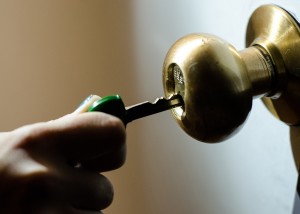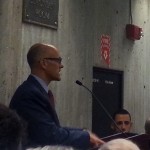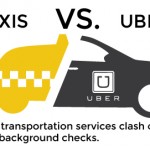
Boston University students living on campus could incur charges for repeatedly locking themselves out of their rooms, due to an update in the Residence Hall Association policy.
Students who must request a temporary key from their resident assistant more than three times during the academic year can be subject to fines of $25 or $50, or other university action including a letter of warning and residence probation, according to an RHA document issued to RAs.
The policy, which applies to Danielsen Hall, Myles Standish Hall & Myles Annex, Kilachand Hall, The Towers, 575 Commonwealth Ave., Warren Towers, 10 Buick St., 33 Harry Agganis Way, Claflin Hall, Sleeper Hall, Rich Hall and 1019 Commonwealth Ave., was instituted to instill more responsibility in students about keeping their keys with them, said Assistant Dean of Students and Director of Residence Life David Zamojski .
“My goal here is to fine nobody,” he said. “We’re not doing this to generate some revenue. I will consider it a success if we educate the students and we see the number of students with multiple lock-outs through the year drop.”
In the 2012-13 academic year, RHA signed out temporary keys to students more than 17,000 times, he said. More than 900 students were locked out three times, 133 students were locked out six times and 23 students were locked out 12 or more times, according to RHA data.
“There is an occasional student who will leave their keys in their room when they go out at night to minimize the risk of losing their keys if they’re out and expect to be able to call the RA on call at one o’clock, two o’clock, three o’clock [or] four o’clock in the morning,” Zamojski said.
Zamojski emphasized the importance of students learning life skills that will be necessary after college.
“We are here to serve and support students – absolutely – but we should be intentional about trying to educate students about the responsibility they have for carrying their keys and IDs,” he said. “There’s no RA on call to help you in life.”
If students are locked out during a time when the office is closed, they should first contact their roommate to gain access, but if that is not an option, they can request assistance from the on-call RA, the RHA document stated.
Zamojski said he knows students who are locked out at night may be hesitant to wake their roommates, but he called avoiding repeated requests for temporary keys a matter of courtesy.
“RAs are students too,” he said. “We’re all here because we want to help students have the best experience possible in residence.”
A student living in a brownstone may face danger if they have to request a key from the RA on call late at night, Zamojski said.
“You each have to walk down the street at three o’clock in the morning to meet at the office,” he said. “From my point of view there’s a bit of a safety issue there.”
Kahtryn Pontes , a senior in the College of Arts and Sciences , said she knows from her RA that students have abused the temporary key system in the past.
“They’d go for a run and didn’t want to lose their key, so they’d purposefully leave it just because they knew the RA could let them back in,” she said. “It kind of makes RA’s jobs easier if there is some sort of penalty in place.”
Pontes also said she finds the fine as a fair price to pay.
“It’s just enough of a deterrent that people who were purposefully doing it will stop, but it’s also not completely unreasonable for a college kid,” she said.
Joseph Zahrobsky , a junior in Sargent College of Health and Rehabilitation Sciences , said he understands the new policy, but does not agree with it.
“If you get locked out of your room more than three times, it is kind of annoying to the RA,” he said. “But especially for newer students, it can be easier to get locked out. I still don’t think you should be fined.”
CAS freshman Keith Clarke said the policy could be effective in making students more vigilant about keeping their keys with them.
“If you lose it that many times, I think they assume you don’t care about it, which is partially true,” he said. “They’re just trying to not take up RAs’ time who could be helping other people with actual problems other than being locked out of their room.”




